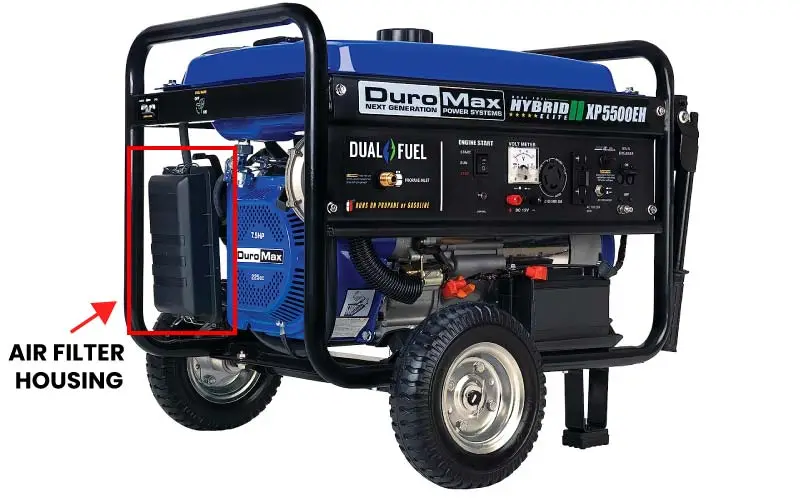How To Clean Generator Air Filter in 6 Steps?
A dirty air filter can reduce the performance of your generator, causing it to consume more fuel and emit harmful pollutants. To avoid these problems, cleaning the air filter should be a part of your routine maintenance.
Air filters act like lungs for generators. Without an air filter, chances are your generator will malfunction.
If the filter is choked, the fresh air flowing to the carburetor will be reduced which will not only cause the generator to misfire but black smoke and gasoline smell will also be among symptoms.
Generators are essential in ensuring a continuous power supply, especially during power outages.
However, to keep your generator running smoothly and efficiently, it’s important to maintain it regularly, including cleaning the air filter.
In this article, we will walk you through the process of cleaning your generator’s air filter and give you tips on how to keep it in top condition. So, if you’re ready to keep your generator running smoothly, let’s get started!
Tools Required To Replace Generator Air Filter
To clean a generator air filter, you will need the following tools:
Safety Precautions
- Disconnect Power: Always disconnect the generator from any power source before cleaning the air filter.
- Wear Protective Gear: Wear gloves, safety glasses, and a mask to protect against dust and debris.
- Be Aware of Hot Parts: Be cautious of hot parts and moving parts of the generator to avoid burns or injury.
- Read the Manual: Always refer to the manufacturer’s manual before cleaning the air filter to ensure you follow the proper procedures.
- Avoid Over-Oiling: If using an oil-soaked foam air filter, be careful not to over-oil it, as this can clog the engine and cause damage.
Note: These precautions may vary based on the specific make and model of your generator, so always consult the manufacturer’s manual for detailed instructions.
How to Clean Generator Air Filter in 6 Steps?
First of all, read the user manual to make sure what following steps apply to your generator.
Now, let’s get into it.
Quick Overview
- Turn Off the Machine
- Unplug Spark Plug
- Remove and Inspect the Air Filter
- Clean the Air Filter
- Pour Engine Oil into the Filter
- Put Everything Back Together
Step 1: Turn Off the Machine
If your generator was already running, turn it off and let it rest for 30 minutes or so, otherwise, the draining oil will be super-hot. Your hands might get burned.
Step 2: Unplug Spark Plug
To avoid an accidental start, remove the spark plug. While you are at it, clean it off using the carb cleaner. Remove any blackness.
Step 3: Remove and Inspect the Air Filter

To remove the air filter, you’ll first need to locate the bolts that hold the air filter housing in place. Depending on the model of your generator, you may need to use a screwdriver or a wrench to loosen these bolts.
Once you’ve removed the bolts, you should be able to remove the air filter from the housing.
If the foam is damaged in any shape or way, you should replace it because it is not that expensive.
Step 4: Clean Air Filter
Gently remove any dirt or debris from the air filter by tapping it on a hard surface or using a soft brush. If the air filter is particularly dirty, you can wash it using soap and water, then let it dry completely before reinstalling it.
Or, you can place it under pressurized water for a few seconds to clean the external layer of dust and debris. Now use the detergent and rub it off.
Now clean it off again using the pressurized water. Repeat the process one more time.
Don’t remove stains with your nails. You will end up chipping off a piece of foam.
Step 5: Pour Engine Oil into the Filter
Pour fresh engine on the one side of the foam which will face the engine. It will keep it well-oiled after washing it with detergent.
Make sure it doesn’t drip from the filter. Squeeze the extra oil.
Recommended Guide: How To Change Generator Oil?
Step 6: Put Everything Back Together
Insert the air filter and make the oiled side faces the engine. Reconnect the spark plug and close the cover. You are good to go.
How Often Should I Clean the Generator Air Filter?

It depends on the use and the area you. If you are using it more than often, should clean it off once or twice a month, and replace it once or twice a year.
As a general rule, it is recommended to clean the air filter every 50 hours of operation or at least once a year, whichever comes first.
In dusty or dirty environments, the air filter may need to be cleaned more frequently to maintain proper engine performance. It’s also a good idea to check the air filter periodically and clean it if it appears dirty. Regular cleaning of the air filter will ensure that the generator is running efficiently and effectively.
Recommended Read: How to Change the generator rope?
What Are the Signs of a Bad Air Filter?
Dry Air Filter:
The air filter catches dust and debris to protect the carburetor (How to clean a carburetor in instant) and fuel line. The color of the filter in this case should be grey and rugged. These are the signs of a dry air filter.
Reduced Engine Performance:
A dirty air filter restricts the flow of air to the engine, which can cause a decrease in horsepower, acceleration, and overall performance.
The carburetor might not supply the proper air-fuel ratio into the combustion chamber resulting incomplete combustion.
This incomplete combustion causes low fuel mileage hence, reduced runtime and engine performance.
If the air filter is clogged, it restricts the flow of air, leading to a decrease in engine performance.
Engine Surge or Stall:
A clogged air filter can cause the engine to surge frequently or stall, especially under load.
This is because the engine is not getting enough air to maintain a proper air-fuel mixture, causing it to run lean and potentially stall. Learn more about generator surging.
Increased fuel Consumption:
A dirty air filter can cause the engine to work harder due to improper air-fuel ratio in the combustion chamber as I have already mentioned above, which can result in increased fuel consumption.
This is because the engine has to compensate for the restricted airflow by increasing the fuel supply, leading to a less efficient combustion process and higher fuel consumption.
Engine Backfire:
A restricted air filter can cause an imbalance between the air and fuel mixture in the carburetor, leading to an engine backfire.
This can happen if the engine is not getting enough air to completely burn the fuel, causing unburned fuel to escape through the exhaust and ignite, causing a backfire.
Black or Gray Smoke From the Exhaust:
This can lead to incomplete combustion and result in black or gray smoke from the exhaust. That black or grey smoke is hazardous to health.
The incomplete also exhausts carbon monoxide which is an odorless, colorless, and poisonous gas that several harms living beings.
Engine Noises:
The engine may have to strain to draw in enough air, causing it to make more noise than usual. You may notice vibrations and strange noises in such cases.
Engine Warning Light:
Some generators have an engine warning light that illuminates when the air filter is dirty or clogged. This is a signal that it’s time to check the air filter and clean or replace it if necessary.
This research on generator air filters will help you understand more about the topic.
Verdict
In summary, a dirty air filter can cause a variety of problems, ranging from reduced engine performance to increased fuel consumption, engine backfires, and abnormal engine noise.
Regular cleaning or replacement of the air filter is important for maintaining proper engine performance and efficiency.
Frequently Asked Questions
Should I Use Engine Oil for my Air Filter?
Pour a few drops of engine oil on one side of the filter and rub it off. The reason for doing it is to trap incoming debris and dust. By doing so, we are protecting the carburetor and combustion chamber.
When Should I Change My Air Filter?
The air filter should be changed every 50 hours of use as a general rule, but it could be changed sooner if the area surrounding the generator is dusty and full of dirt.
Can a Generator Run Without An Air Filter?
A generator can run without a filter but it isn’t advised because the air filter catches and traps the incoming dirt and debris to protect the carburetor and combustion chamber.
If you remove the air filter, the following could happen.
-Black smoke exhaust and excessive hydrocarbons emission
-Extra fuel consumption
-Poor engine performance
-Harm to the carburetor, piston, fuel line, and cylinder walls.

Fareed, the highly skilled electrical expert, boasts 5 years of extensive experience in proficiently maintaining, repairing, diagnosing, and installing a diverse range of electrical systems.
